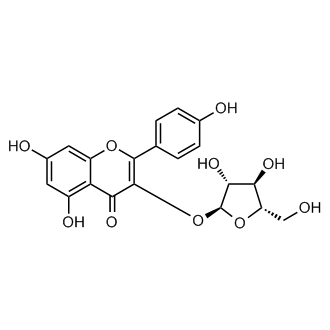| Size | Price | Stock |
|---|---|---|
| 1mg | $140 | In-stock |
| 5mg | $350 | In-stock |
| 10 mg | Get quote | |
| 50 mg | Get quote | |
| We match the lowest price on market. | ||
We offer a substantial discount on larger orders, please inquire via [email protected]
or Fax: (86)21-58955996
Inquiry for price and availability only. Please place your order via our email or fax.
| Cat. No. : | HY-N3442 |
| M.Wt: | 418.35 |
| Formula: | C20H18O10 |
| Purity: | >98 % |
| Solubility: | DMSO : 100 mg/mL (ultrasonic) |
Juglanin, a occurring flavonoid that can be isolated from crude Polygonum aviculare, is a JNK acticator, with anti-inflammatory, anti-oxidant and anti-tumor activities. Juglanin can induce apoptosis and autophagy on human breast cancer cells[1][2].
IC50 & Target::IC50: 26.35 μM (MCF-7 24 h), 20.07 μM (SKBR3 24 h), 29.13 μM (MDA-MB-231 24 h), 24.17 μM (BT474 24 h)[1]
IC50: 14.38 μM (MCF-7 48 h), 17.69 μM (SKBR3 48 h), 23.25 μM (MDA-MB-231 48 h), 19.85 μM (BT474 48 h)[1]
In Vitro:Juglanin (0-40 μM, 24-48 h) inhibits the proliferation of breast cancer cell in a dose- and time-dependent
manner and presents less cytotoxic against the normal cells[1].
Juglanin (0-10 μM, 24 h) induces the G2/M phase arrest and Caspase-dependent apoptosis in MCF-7/SKBR3 cells[1].
Juglanin (10 μM, 24 h) promotes ROS generation and enhances JNK activation in MCF-7/SKBR3 cells[1].
Juglanin (40-160 μM, 24 h) inhibits inflammation and attenuates neuroinflammation in Lipopolysaccharides (LPS, HY-D1056)-treated AST cells[2].
Juglanin (40 μM, 24 h) inhibits Sting expression in TGF-β1-incubated MRC-5 cells[3].
In Vivo:Juglanin (10-20 mg/kg, i.p., daily, 7 days) inhibits growth of human breast cancer xenograft in a tumor-transplanted mouse model[1].
Juglanin (10-30 mg/kg, i.p., 5 times weekly) ameliorates neuroinflammation-related memory impairment and neurodegeneration through impeding TLR4/NF-κB in C57BL6 male mice[2].
Juglanin (80 mg/kg, i.g., daily, 21 days) protects against bleomycin (BLM, HY-108345)-induced lung injury by inhibiting fibrosis in C57BL/6 male mice[3].
Lorem ipsum dolor sit amet, consectetur adipisicing elit. Autem earum hic iste maiores, nam neque rem suscipit. Adipisci consequatur error exercitationem fugit ipsam optio qui, quibusdam repellendus sed vero! Debitis.
Inquiry Information- Product Name:
- Juglanin
- Cat. No.:
- HY-N3442
- Quantity:


Your information is safe with us.